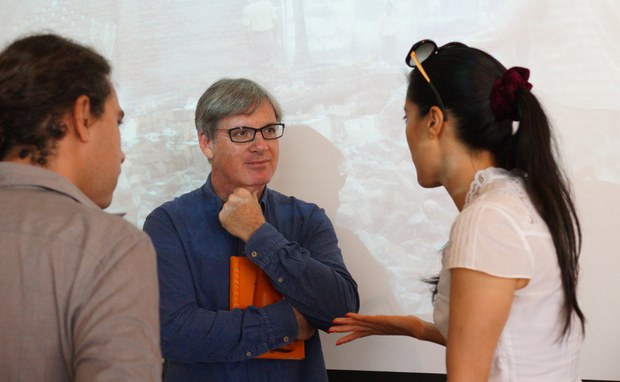Thailand: Media Advocates Worry About Junta's Encroachment on Press Freedom
2016.03.11
Bangkok
 Jonathan Head (center), the chairman of a professional committee of the Foreign Correspondents’ Club of Thailand, chats with colleagues in Bangkok, March 11, 2016.
Jonathan Head (center), the chairman of a professional committee of the Foreign Correspondents’ Club of Thailand, chats with colleagues in Bangkok, March 11, 2016.
The situation for reporters in Thailand is “dire,” a senior journalist told diplomats in Bangkok, citing military “attitude adjustments” for the local press corps and new visa restrictions for foreign media.
Press and internet freedom have eroded steadily under the Thai junta since the generals seized power in May 2014, Shawn Crispin, senior Southeast Asia representative for the Committee to Protect Journalists (CPJ), told a group of ambassadors this week.
Yet in his 17 years as a Bangkok-based reporter, “the situation for reporters, apart from when bullets are flying in the national capital during political protests, has never been more dire,” Crispin said.
Since the coup on May 22, 2014, the government led by former Gen. Prayuth Chan-o-cha has cracked down on members of media and vowed to eradicate any reporting seen as offensive to the monarchy, according to Crispin.
Thai reporters have faced stricter scrutiny of their work over the last two years, and they “operate in a climate of fear and uncertainty, never sure exactly where the line between permissible and off-limits reporting lies,” Crispin said.
“Local journalists who have crossed that vague line have suffered increasingly harsh reprisals, including so-called ‘attitude adjustment’ sessions in military custody,” according to a transcript of his remarks that were posted on CPJ’s website Thursday.
Pravit Rojanaphruk, a senior writer for Khaosod English, is a Thai reporter who has twice been summoned by the military for “attitude adjustment” sessions.
Journalists are called in for these brief periods of detention as a reminder to stop reporting critically about the junta, Pravit told BenarNews.
“There have been at least four Thai journalists receiving attitude adjustments. They were from Prachathai, Fadiewkan and a cartoonist as well as me,” he said.
Last September, journalists and free press advocates called on the junta to free Pravit, who was a columnist for The Nation at that time, after he was held for an attitude adjustment.
He was asked to sign a document, failing which “he would be charged with sedition,” a government spokesman said at the time.
In a separate episode, Pravit was held for a weeklong attitude adjustment session in May 2014, according to reports.
Foreign journalists could be forced to leave
Until now foreign reporters mostly have been immune from that the fear that stalks local reporters, but that could change soon, Crispin warned.
New restrictions on visas for foreign journalists, which are to take effect March 21, “could instill the same self-censorship practiced among local journalists in the foreign media,” he said.
“If strictly enforced as written, the guidelines will inevitably hollow out Thailand’s now robust foreign press corps and further curb critical news coverage of Chan-o-cha’s rights-curbing junta,” he added.
Previously, Thailand’s Ministry of Foreign Affairs (MFA) provided foreign journalists with Type-M or Media visas, and allowed them to acquire a press card from Thailand public relations department. It also allowed them to get visa extensions from the immigration bureau and a work permit from the ministry of labor at a one-stop service office.
“The guidelines give authorities the power to deny visa applications in punitive response to any news they deem as ‘disruptive’ to public order or security,” Crispin said. “How officials will measure or determine what constitutes a ‘disruption’ is unclear.
The new policy also requires that foreign journalists must work full-time for a registered news organization – a move that could negatively affect freelance reporters.
“If Thailand truly wanted to get in step with the changing nature of global media, it would implement measures that aimed to promote and protect freelancers, not restrict them,” Crispin added.
Last month, after the New York-based CPJ first publicized its concerns about the new visa policy, the government released a statement denying that the policy was aimed at tightening access to the country for foreign reporters.
“Journalists, correspondents and freelancers employed by a news agency registered with the competent agency of either Thai or foreign government will not be affected,” the statement said.
The new guidelines were not intended to “restrict, forbid or limit the work of foreign media, as well as foreigners who work in Thailand,” it added.
‘Very stressful’
Since Jan. 1, journalists have sought assistance in obtaining visas, Jonathan Head who chairs a professional committee of the Foreign Correspondents’ Club of Thailand (FCCT), told BenarNews on Friday.
“In the last two months, I’ve been contacted by more than 10 people who have had problem with an M-visa that had them rejected – and that is very stressful,” Head said.
“Some of them have lived here for a long time. The MFA advised them they can get business visa instead,” he added. “And if an application for an alternative visa is not successful, they have to leave Thailand.”







